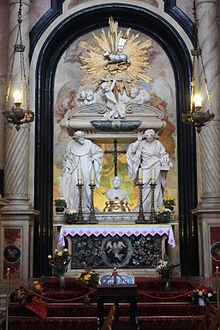On this Christmas Eve’s Eve, we quietly celebrate the commemoration of John of Cantius (1390 – 1473), or ‘Kanty’ in the original Polish transliteration – a scholar, a teacher, a gentleman, a priest and, most of all, a saint, who spent his whole life as a professor at the Krakow Academy, later named the Jagiellonian, which still maintains a high standard of scholarship to this day. It was here that a young Karol Wojtyla – the future Pope John Paul II – did his undergraduate studies in philology and various languages, standing the future polyglot in good stead as a spiritual father to over a billion Catholics.
Father John, although sharing Polish heritage, did not have the well-traveled, public vocation of the future pontiff, but spent most of his life in one place, stationed at his university, teaching philosophy, beloved by all his students. He did contribute to the advance of what we now call science, helping to formulate the theory of impetus, the basis of Newton’s first law, which undergirds all of modern physics.
Yet his guiding principle was humility, a life hidden from the wider world, following the maxim of the future Saint Philip Neri – whom he resembles in some ways – amare nesciri, ‘love to be unknown’. He always sought the lowest place, and so wax brought higher. The holy priest took as his motto:
Conturbare cave: non est placare suave, Infamare cave; nam revocare grave.
(Beware disturbing: it’s not sweetly pleasing, Beware speaking ill: for taking back words is burdensome.)
He was a model and inspiration to all, his life a round of prayer, study and teaching, all founded on his relation to the Triune God, and the Word Incarnate. As today’s Office says of him:
Every day after his round of duties he would go straight from the lecture room to church. There he would spend long hours in contemplation and prayer before the hidden Christ of the Eucharist. The God in his heart and the God on his lips were one and the same God.
Cantius lived this holy and rather quiet regime of prayer, teaching, study and charity until the ripe old age of 83.
We are again in a crisis of truth, with so many mired in, and perishing of, ignorance, as the prophet Hosea decried. Those outside the Church know little of the faith (as any perusal of atheists such as Richard Dawkins will attest); but what is more sad, most Catholics also know little of what Christ has revealed; and what is saddest of all, many do not seem to care, something I find very puzzling and, I must admit, at times disheartening.
For only the truth can set us free, and the slavery of ignorance is the worst sort. We are called to such a lofty vocation, to immerse ourselves in all the best that has been written or thought, to follow dreams, hopes and memories beyond the superficial and earthly.
We, as creatures made in God’s very image, and by our reason truly transcend the prison of the present tense, to reflect upon the past, and ponder the future, to enter in some way into eternity by that scintilla, or spark, of the divine Mind itself that He has given us.
So in this season of light, on the very edge of Christmas and the birth of our Saviour, we should make a resolution to develop our minds and souls, to fan into flame that scintilla, to follow in some small way the example of Saints Peter Canisius and John Cantius and all the heavenly host. Strive to know the faith that we profess, how revealed truths complement those of reason, history, science, and how to explain and defend what we know to be true to others (cf., 1 Peter 3:15).
And, in the midst of all that we now do, may these last days of Advent bring you many graces, as we prepare for the great joyful feast of Christmas. And may it be a very merry one for one and all. +

